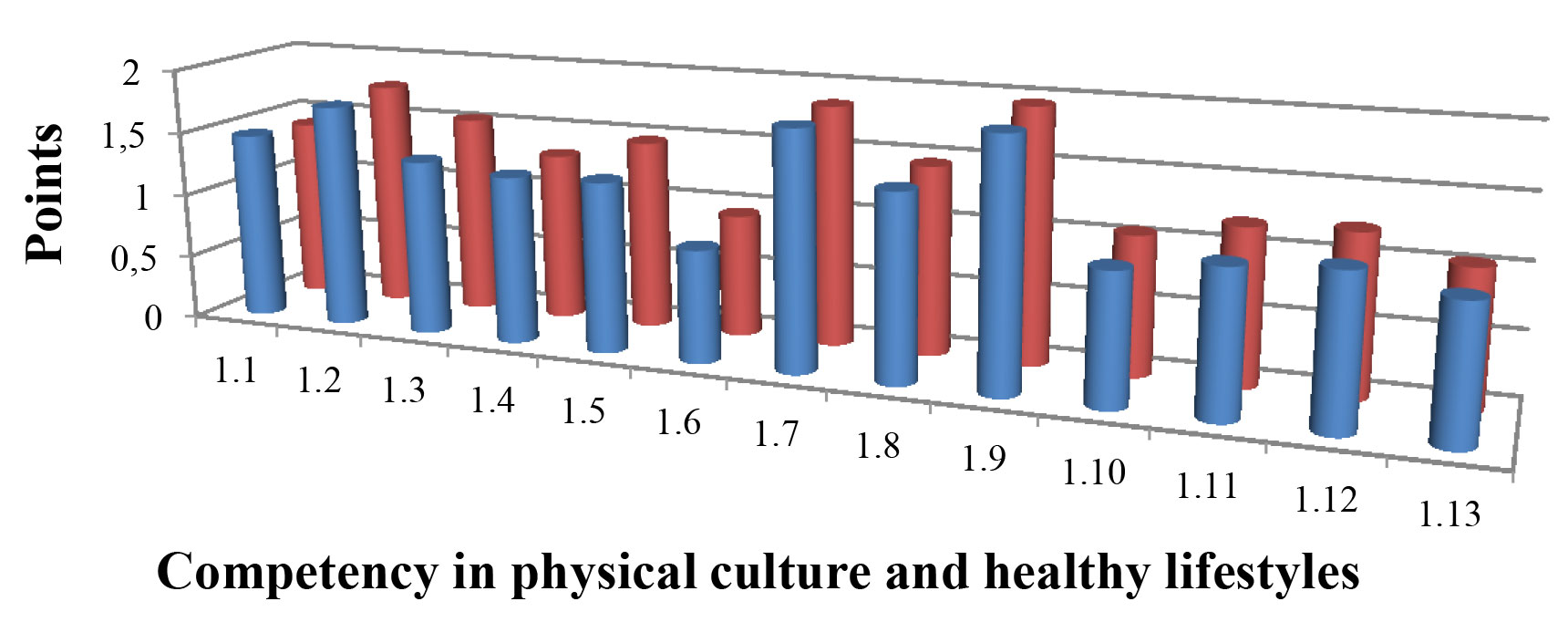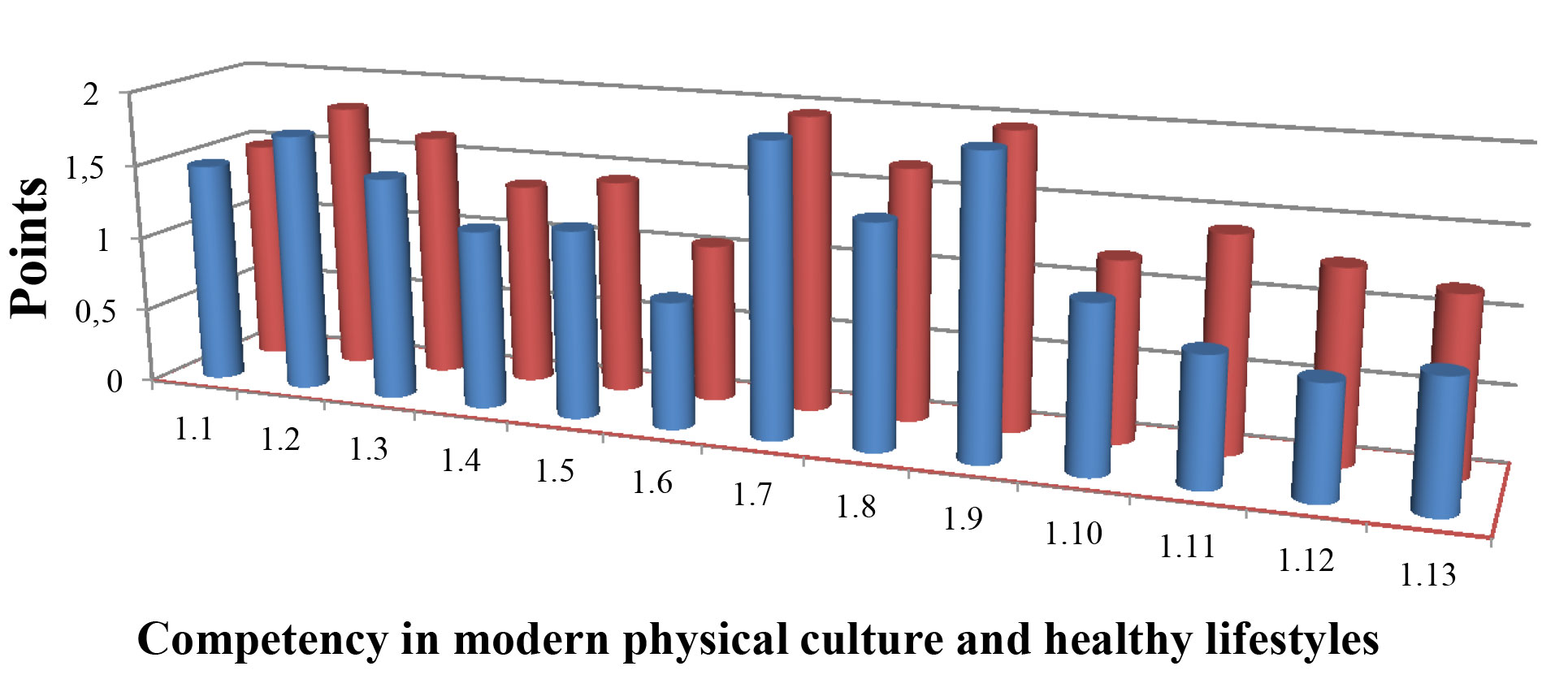Donetsk National University students' attitude to healthy lifestyles rated by questionnaire survey
ˑ:
PhD, Professor S.I. Belykh1
Donetsk National University, Donetsk
Keywords: academic physical education improvement strategy, healthy lifestyle, physical culture, categorical questionnaire survey.
Background. The physical fitness and functionality rates of Ukrainian university students are reported being on the constant fall. This persistent trend is demonstrated, among other things, by the speed-strength and endurance test rates and student’s biological age rating studies (N.V. Danilova, 2010; S.I. Prisyazhnyuk, 2010) that show the valid academic physical education practices being largely inefficient. The main academic physical education improvement strategies applied today may be provisionally classified into traditional and new ones [1]. The traditional body-development-centered strategy gives a high priority to the educator-student (subject-object) cooperation and largely neglects the academic educational process humanization idea on the whole and its implications for the physical education domain in particular [2-4].
The new academic physical education improvement strategy applied, among other things, to the physical education component to prioritize and cultivate a personality-centered physical education model may be described as specific in the following aspects:
– It strives to part with the educator-student (subject-object) cooperation with its educational process dictation style to make a transition to the subject-subject format i.e. the educational process management style;
– It makes an attempt to upgrade the student’s role from the passive object of the educational efforts to the process subject expected to make his/her own contribution to the cognitive process – to build up a fully-fledged constructive bilateral learning process including its physical culture domain; albeit it should be recognized that presently the traditional academic physical education model gives the top and exclusive priority to the physical training and progress goals;
– It helps switch over the faculty attention from the corporality related aspects to the personality-centered ones to make a special emphasis on individual values, motivations, knowledge and skills to help the students duly customize and manage their own physical training and health improvement practices to reach and maintain the best mental and physical fitness rates; and
– It is designed to facilitate the individualized educational, cultural and development process under the personality-centered physical education model to fully mobilize and reinforce the educational resource of the academic physical education discipline.
In the efforts to implement the new academic physical education improvement strategy, the relevant specialists shall pay special attention to the necessary provisions to facilitate the educational process including due prerequisites for the students’ self-assertion in the context of their life priorities and motivations in the academic physical education and sports domain; to help them find the best formats and models for the individual physical practices and progress; and to effectively encourage the individual physical culture building process (V.M. Dvorak, 2009; V.V. Prikhodko, 1992).
Objective of the study was to rate the students’ attitudes to the academic physical education by a questionnaire survey with a special emphasis on the healthy lifestyle related aspects and values with relevant knowledge, skills and challenges for the health agenda in the academic environments.
Methods and structure of the study. The focused questionnaire survey was performed using a special questionnaire form of our own design, with the first- and fourth-year male (n=324) and female (n=326) university students (n=650 in total) being subject to the study. The responses were rated by points on the relevant scale to rate the respondents’ physical activity levels.
Study results and discussion. Only 11.11% males and 3.99% females in the sample were scored ‘excellent’ as a result of the survey that means that only 7.45% of the sampled first- and fourth-year student population of both sexes feel fully physically fit and active; and this trend cannot but raises concerns and may be indicative of the valid academic body-training-centered Physical Education curriculum being inefficient.
Of the 650 students polled, 41.54% (n=270) reported being dissatisfied with the theoretical knowledge and practical skills provided by the academic physical education service. It should be mentioned that the survey data showed most of the sample giving high priority to their own health protection and improvement issues. The questions designed to rate the students’ knowledge in the HLS and physical culture domain showed the first- and fourth-year male student population having some knowledge in the very general matters only. Given on Figure 1 hereunder are the summarized questionnaire survey data for the male student population of Donetsk National University demonstrating the respondents’ competency in the modern healthy lifestyles and physical culture.

Figure 1. Male student population of Donetsk National University: summarized questionnaire survey data to profile their competency in modern healthy lifestyles and physical culture
In the male population, knowledge of the harmful effects of tobacco, alcohol, drugs overeating etc. was rated by 1.9-1.91 and 1.96 points in the first- and fourth-year students, respectively; knowledge of the key body, hair, mouth, cloth, house, footwear hygiene rules was rated by 1.7-1.84 and 1.86 points in the first- and fourth-year students, respectively; and knowledge of the physical training effects on health was rated by 1.2-1.74 and 1.77 points in the first- and fourth-year students, respectively.
The above ‘right knowledge’ is normally obtained at schools and complemented by the academic valeology (healthcare science), life safety and other relevant disciplines, with the ‘book knowledge’ found to dominate in the sample, whilst more profound and practical knowledge of the modern physical culture and healthy lifestyles that could form a basis for the student’s engagement into active physical training or sport practices for health was found regretfully poor in the surveyed groups. It is clear that the present school and university educational systems have failed to develop such knowledge as yet.
In the female population, knowledge of the harmful effects of tobacco, alcohol, drugs, overeating etc. was rated by 1.9-1.96 in the first- and fourth-year students; knowledge of the key body, hair, mouth, cloth, house, footwear hygiene rules was rated by 1.7-1.93 and 1.96 points in the first- and fourth-year students, respectively; and knowledge of the physical training effects on health was rated by 1.2-1.73 and 1.8 points in the first- and fourth-year students, respectively. Both males and females however (see Figures 1 and 2) showed poor competency in the practical matters of the modern physical culture and healthy lifestyles.

Figure 2. Female student population of Donetsk National University: summarized questionnaire survey data to profile their competency in the modern healthy lifestyles and physical culture
Conclusion. The survey data showed the significant shares of the sample (45.68% and 37.42% of the male and female students, respectively) being dissatisfied with the scope of the theoretical and practical knowledge and skills provided by the university in the health improvement, physical development and physical fitness domain i.e. under the academic Physical Education curriculum, with the average dissatisfaction rated at 41.54% of the sample (n=650). Therefore, the valid academic physical education curriculum needs to be revised to expand the scope of the theoretical knowledge related to healthy lifestyle (HLS) and physical culture.
References
- Belykh S.I. Aksiologicheskie osnovaniya postroeniya lichnostno orientirovannogo protsessa fizicheskogo vospitaniya studentov [Axiological grounds for individualized academic physical education process]. Teoriya i praktika fiz. kultury, 2017, no. 11, pp. 42–45.
- Zinoviev N.A., Bavykin E.A. Zdorove v sisteme tsennostnykh orientatsiy studentov v kontekste sportivnoy deyatelnosti [Health value in students' system of values in the context of sporting activity]. Teoriya i praktika fiz. kultury, 2017, no. 5, pp. 19–22.
- Kokoulina O.P., Kopylova N.E., Efremova N.G., Zaytsev V.A. Povyshenie zainteresovannosti studentov v zanyatiyakh fizicheskoy kulturoy [Actions to increase students' motivations for physical education]. Teoriya i praktika fiz. kultury, 2017, no. 9, pp. 22–25.
- Lubysheva L.I. Sport i sotsializatsiya: ot metodologii sportizatsii – k innovatsionnym sotsiokulturnym proektam [Sport and socialization: from sport-centered methods to innovative socio-cultural projects]. Fizicheskaya kultura: vospitanie, obrazovanie, trenirovka, 2017, no. 1, pp. 2–4.
Corresponding author: kf.physical_education@donnu.ru
Abstract
The physical fitness and functionality rates of Ukrainian university students are reported to be on the constant fall. A theoretical analysis under the study demonstrated that the present academic physical education improvement strategies can be basically classified into traditional and new ones. It should be emphasized that the traditional strategy is largely deficient due to being at least reluctant to the academic education humanization idea on the whole and its implications for the academic physical education system in particular. Therefore, we believe that the traditional strategy needs to be replaced by the new strategy giving a top priority to a transition from the educator-student (subject-object) relationship (with the authoritarian process management by the educator) to the equal interpersonal (subject-subject) relationship management style, with the faculty attention being switched from the corporeality-centered teaching formats to the personality-building ones. For the purposes of the new strategy implementation, we performed a questionnaire survey to rate the Donetsk National University students’ attitudes to the modern healthy lifestyles and physical culture.
Subject to the study were the first- and fourth-year male (n=324) and female (n=326) students. The survey data showed the significant shares of the sample (45.68% and 37.42% of males and females, respectively) being dissatisfied with the scope of the theoretical and practical knowledge and skills provided by the university in the health improvement and physical development domain i.e. under the academic Physical Education curriculum, with the average dissatisfaction of the sample (n=650) rated at 41.54%. Therefore, the valid academic physical education curriculum needs to be revised to expand the scope of the theoretical knowledge of the modern healthy lifestyle (HLS) and physical culture.



